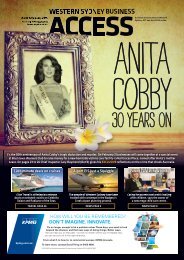RECRUITMENT
WSBA September 2015
WSBA September 2015
Create successful ePaper yourself
Turn your PDF publications into a flip-book with our unique Google optimized e-Paper software.
GWSRR<br />
“I read a really good line. It says: learning has no end date. And it stays<br />
with me all the time.” - Jim Taggart.<br />
WWW.WSBA.COM.AU<br />
Nicole Karagiannis.<br />
Tom Graham and Alison Wood.<br />
Continued from page 30<br />
that means is that a whole lot of stuff that’s<br />
currently being done onshore will be done<br />
offshore at a fraction of the price, which has<br />
already been happening for years anyway. But<br />
it will, you know, escalate. And it means that,<br />
you know, anybody – English is the passport.<br />
So people want that training.<br />
Jim Taggart: Yeah. It’s the currency.<br />
Alison Wood: And in ASEAN countries,<br />
they’re starting to develop up their qualifications<br />
which are portable across ASEAN<br />
states. And the qualification framework<br />
they’re using is the Australian one because<br />
it fits. So, you know, I mean in the future it<br />
really is going to be – which is why in TAFE<br />
– and certainly I know with kids in University<br />
too – my daughter’s one of them – every<br />
second person studies International Studies<br />
and have an opportunity to study abroad for<br />
a year. So, my daughter’s off to Japan next<br />
year. And that is how those kids are going to<br />
maintain their employability – having that<br />
global experience.<br />
Jim Taggart: And thank you for sharing<br />
that, because that’s really where I was<br />
going down with the “invisible hand” and<br />
Adam Smith – that the global village now<br />
– knowledge, skill development is a much<br />
wider passport and things. It’s quite interesting.<br />
In a number of schools, Mandarin and<br />
other language – sorry – in NSW language<br />
is declining. This is important because it’s<br />
dealing with skills. It’s skill development. And<br />
yet, in a number of schools, they’ve taken that<br />
on as a mandate within their curriculum and<br />
so on. And particularly in primary schools.<br />
That’s critical in terms of employer/employee<br />
development. And that’s why I started leading<br />
with a question, by saying: it is the employer’s<br />
role to pay for training – or is it? Where does it<br />
become the ownership of the individual to do<br />
that? And I think Scott you were talking about<br />
that. But it’s really interesting – that whole<br />
migration and change.<br />
Hardeep Girn: Can I just say these couple<br />
of points? One is going back to the previous<br />
comment on the global village, but also<br />
the role of the government and the role of the<br />
employer. If there is going to be economic<br />
success at the state level, at the national or<br />
at an international level, then certainly the<br />
government and the employer needs to put<br />
their hand in their pocket to ensure that the<br />
employees get what they need to develop<br />
not just the organisation, but where they’re<br />
entering into new markets – be it that they’re<br />
going to be learning a new language or a new<br />
skill or a new craft. I think that employees do<br />
have to consider that they can’t have a fully<br />
flexible work environment because there’s a<br />
lot of other forces at play where there’s a lot<br />
of labour, a lot of people who are talented,<br />
there are a lot of people who are, applying for<br />
the same type of job. So, I wouldn’t want to<br />
figure a guess on what’s the average number<br />
of applicants per job. But I would imagine<br />
it’s quite significant across most sectors at<br />
the moment given the low unemployment<br />
rate. So, with overseas students as well, the<br />
education is delivered more online. There is a<br />
global demand for that type of education. I’m<br />
interested to hear more on what TAFE are<br />
doing in other markets – not just in China,<br />
but in India...<br />
Alison Wood: Yeah. It’s huge. It’s huge.<br />
There are a lot of opportunities there. Just one<br />
other point there. And that maybe again, it’s<br />
a difference between the tertiary sector – the<br />
Universities and vocational education and<br />
training – has been is that we are moving vocational<br />
training into a marketised system where<br />
the student chooses what they wish to train in.<br />
We weren’t like that previously. When we were<br />
mainly subsidised by the government, the<br />
government set the areas. Well, we assisted in<br />
using you know data access – economic data –<br />
and we would say we need this many people in<br />
this industry area and this many in this – and<br />
that’s what we were paid to deliver. So, we had<br />
a performance agreement and we delivered.<br />
So I know when I worked at Ultimo, we only<br />
ever offered 70 places in fashion design. We<br />
always had over a thousand applicants. So, the<br />
system that we’ve moved into now is it’s a student<br />
driven system – the same as the Universities.<br />
So, that’s why there are enough journalists<br />
being trained by Universities every year as the<br />
number of positions in Australia. The same<br />
with lawyers. And the same in our area. Now<br />
we have got ekes of people enrolled in fashion<br />
design because that’s the student demand and<br />
that’s how – it’s an entitlement system. That<br />
is an issue. On a personal level I think that<br />
there needs to be more engineering around<br />
how subsidies are used and how governments<br />
direct subsidies to be used. And I believe it<br />
should happen in Universities as well as in<br />
vocational training, because at the moment<br />
we’ve got a lot of unemployed graduates. 40%<br />
of University graduates are still unemployed<br />
after six months of completing their Degree.<br />
Michael Walls: Is that across all Degrees<br />
– all different types of Degrees? All over the<br />
place?<br />
Alison Wood: That’s a high level statistic,<br />
so it varies. But I know that there’s far too<br />
many law graduates at the moment.<br />
Tom Graham: Exactly.<br />
Alison Wood: So, you know, we’ve got<br />
a huge skill shortage coming up in construction,<br />
plumbing – any of the traditional trades.<br />
No parents want their kids to go into those.<br />
They’re all aspirational. They want them to<br />
have the University Degrees and go into those<br />
areas. But in fact there’s going to be huge skill<br />
shortage areas where we’re not going to have<br />
enough.<br />
Hardeep Girn: And even the migrant test<br />
has those skills at the top – the carpentry, the<br />
plumbing, etc.<br />
Alison Wood: That’s right. That’s why.<br />
Hardeep Girn: It’s not the lawyers that<br />
the country needs.<br />
Jim Taggart: Ok We are coming to the<br />
end of our session here today so I’m just going<br />
to call on Hardeep to sum up what this has<br />
meant for him. Hardeep, please?<br />
Hardeep Girn: It’s around the value<br />
proposition. For employees as well as employers.<br />
And it comes back down to the key<br />
skills. So, in changing times, you do need to<br />
be able to communicate well. You do need to<br />
be able to have the confidence. And certainly,<br />
the capability internally and externally is so<br />
important. I think there is an abundance of<br />
technical knowledge out there. And I think<br />
our competitive edge as a society and as a<br />
country is what we develop as individuals<br />
through personal development. That’s the<br />
reason we put this course together in the<br />
first place, to ensure that those skills that are<br />
slowly declining around communication,<br />
confidence and capability, aren’t forgotten.<br />
The danger is, as more people see technical<br />
knowledge as a commodity in what they’re<br />
selling and doing, that you don’t have a point<br />
of difference. And you have to have a point of<br />
difference in business; otherwise, we won’t be<br />
successful.<br />
Jim Taggart: Hardeep, on behalf of Access,<br />
a very huge vote of thanks to Know My<br />
Business, one of your very successful businesses.<br />
It’s been a great time of interaction. I<br />
think it’s been very real and very timely. All<br />
of you have come together with intelligent<br />
comment. And I say that most sincerely. And<br />
that’s the first time that I’ve said that. David’s<br />
been at many of those. So have you and so has<br />
Michael. I’ve thoroughly enjoyed listening<br />
and reflecting upon what each of you have<br />
said. So again, on behalf of Access and Know<br />
My Business, Hardeep, thank you so much for<br />
your attendance and support this afternoon.<br />
Thank you.<br />
The GWSRR in action.<br />
WESTERN SYDNEY BUSINESS ACCESS SEPTEMBER 2015<br />
31






